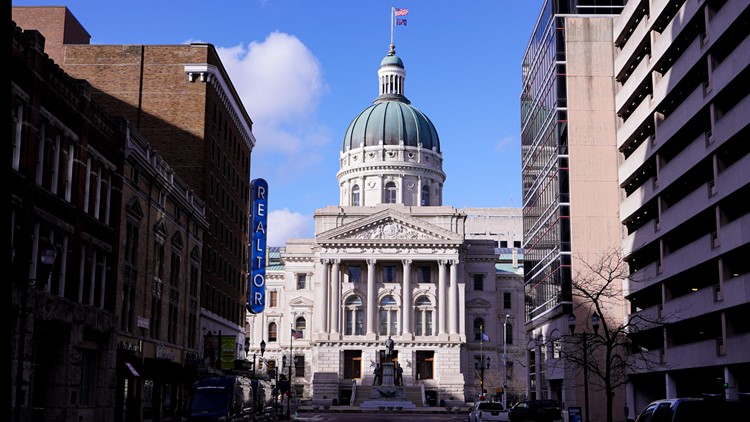INDIANAPOLIS — Indiana Republicans have dominated state politics over this past generation, holding all Statehouse constitutional offices, super majorities in the General Assembly and all but two seats of the congressional delegation for much of the past decade.
Aug. 14, 2001 became the fateful date when they began to turn things around after Democrat Governors Evan Bayh and Frank O’Bannon had won the previous four gubernatorial elections. That was the day The Phoenix Group had its open house at the Klipsch Audio Technologies headquarters near The Pyramids in Indianapolis.
It was a fundraiser like no other the party had seen in years. The Phoenix Group had formed earlier that year by GOP financiers Jim Kittle, Bob Grand and Randall Tobias in an effort to reinvigorate the once thriving Indiana Republican machine that had been shut out of gubernatorial races since the rise of Evan Bayh in 1988.
Kittle and other Republican financiers had grown frustrated over what they saw as a four-year cycle of “reinventing the wheel” when it came to statewide races. “It seems like we start from scratch every time,” he told Howey Politics in 2001. And there was growing frustration over high-level campaigns run by John Mutz, Stephen Goldsmith, David McIntosh and Indianapolis mayoral nominee Sue Anne Gilroy where a lack of money hadn’t been a problem. What had hamstrung Indiana Republicans was top-flight competition, poor strategy and execution, and a lack of competitive technology.
The Phoenix Group was essentially a shadow party. When Mike McDaniel stepped down, it created a race between Kittle and Grant County’s John Earnest (who had lost a chair race to Rex Early a decade before), with Kittle prevailing.
It was all seen as a precursor to Mitch Daniels leaving his White House budget director post to run for governor. That notion had been speculated months before. I remember meeting Chairman McDaniel earlier that year when he said the Republicans had a secret weapon. He then wrote the name “Mitch Daniels” on a piece of paper.
Daniels was an acolyte to legendary Marion County Chairman Keith Bulen, then rose through the ranks as a staffer to U.S. Sen. Richard Lugar, at one point leading the National Republican Senatorial Committee. After Dan Quayle was elected vice president in 1988, Gov. Robert Orr had offered Daniels the open Senate seat, which he turned down due to family considerations.
Kittle, Grand and Tobias essentially created The Phoenix Group to lure Daniels out of the White House and into the 2004 governor’s race.
Daniels would say after Kittle was elected chair, “I would walk across hot coals for Jim Kittle and Ed Simcox.”
As we all know, Daniels did return to Indiana full time (he didn’t move the family to Washington when he worked for President George W. Bush) coming back to defeat Democratic Gov. Joe Kernan in 2004, setting in motion the second GOP dynasty that is still intact today.
Rex Early enunciated the central truth about the reality of a major party power: “Being state chairman with a governor and being state chairman without a governor is the difference between ice cream and dog poop.”
Since 1960, there have been 37 Republican and Democratic chairmen and, for two years, Ann DeLaney ran the Indiana Democratic Party. This club of power is almost exclusively dominated by white males. In addition to DeLaney, the only minority chair was Robin Winston, who led Indiana Democrats under Gov. Frank O’Bannon.
There were the transformational chairs like Republicans James Neal, Jim Kittle, Eric Holcomb and now Kyle Hupfer, and Democrats like John Livengood and Joe Andrew, who helped pave the way for gubernatorial party switches and prolonged power maintenance.
There were placeholder chairs like McDaniel and Democrats Gordon St. Angelo, Dan Parker and John Zody, who attempted with varying degrees of success to stabilize their parties while lacking resources (i.e. the governor).
There were those who served at the pleasure of their governors: Thomas Milligan and Bruce Melchert under Gov. Doc Bowen; Gordon Durnil during Gov. Orr’s two terms; Murray Clark and Holcomb under Gov. Daniels; Hupfer under Gov. Holcomb; Democrats John Livengood, Michael Pannos and DeLaney under Gov. Bayh, and Winston under Gov. O’Bannon; Joe Hogsett and Kip Tew under Gov. Kernan; Tim Berry and Jeff Cardwell under Gov. Mike Pence.
And there were the rescue chairs – Early and current Democratic Chairman Mike Schmuhl – who took the job when their parties were at a low ebb.
Schmuhl took the helm of Indiana Democrats in March. The party has been relegated to essentially Indianapolis, Lake County and the university cities. There are only two Democrats in the General Assembly south of Bloomington.
He is now leading Democrats on a “Small Town Tour” hoping to show voters, as former legislator Melanie Wright said last week, that they “don’t have horns” sprouting from their heads. According to Schmuhl, the party has to show up even in the deepest red counties. This past week Schmuhl, former congresswoman Jill Long Thompson and others have appeared in LaGrange, Cicero and North Vernon to talk about President Biden’s American Rescue Plan.
Told about Rex Early’s quote about being a chair without a governor, Schmuhl knew about it, saying, “That’s a really good one. I had ice cream last night.”
The columnist is publisher of Howey Politics Indiana at www.howeypolitics.com. Find Howey on Facebook and Twitter @hwypol.



